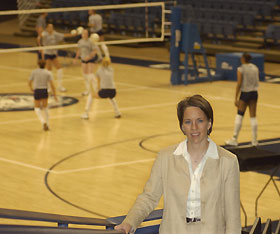|
This is an archived article.
For the latest news, go to the
Advance Homepage
For more archives, go to the Advance Archive/Search Page. | ||
|
Kinesiologist Focuses On Issues Facing As a young girl, Jennifer Bruening found that doors of athletic opportunity did not open easily but they did open. By playing basketball, track & field, volleyball, and baseball (not softball), she learned that sometimes before a door can be opened, new ground must be broken.
Now, as an assistant professor of kinesiology in the Neag School of Education, she hopes her research may break new ground and help doors open more freely for today's aspiring young female athletes. Bruening studies issues confronting women in sports, especially African American women. But data are scarce, and gathering them means casting a wide net to include the experiences of male athletes, coaches, and administrators as well. "I'm trying to understand the experience of all student athletes in collegiate sports," she says. She'll apply that understanding to the specific experiences of female African-American athletes. Traditional options open to female athletes are largely limited by stereotypes, Bruening says. In the years following Title IX, an understanding developed that women wanted to - and were able to - play just about any sport, from field hockey to football. But the situation didn't change much for African-American women. While coaching volleyball Bruening noticed an absence of African-Americ an players and, although she is white, she thought the topic merited research. She found there were very few African-American women in almost any sport, except basketball and track and field. "The stereotype says African-American women are meant to play basketball and run track - they run fast and jump high," she says. "The women who don't play those sports find themselves being considered a 'token.' "It can be very isolating for them," Bruening adds. "Many of their teammates have never played with an African-American, and they may say hurtful things out of ignorance, not necessarily out of insensitivity." It's not just their peers who may make inadvertently insensitive or ignorant remarks. Administrators and coaches may lack an understanding of the inappropriateness - and the impact - of a careless word. Bruening says such treatment can drive athletes to seek acceptance in sports more routinely associated with African-Americans. And that just perpetuates the stereotype. To date, the information about the experience of African-American female athletes exists only anecdotally, Bruening notes. A grant she received recently may change that. The grant allows her to travel to 10 Division I institutions to survey students. Bruening hopes to follow up the survey at the same schools and talk specifically to the female African-American athletes there. Although she's clear about her goals, she doesn't expect the study will be easy. "Student athletes are hard to reach because they are very well protected," she says, noting that this protection is necessary. But as her work progresses, she hopes coaches and athletic administrato rs will see the advantages of accumulating knowledge, overcoming obstacles, and opening doors. "It's not about winning and losing, it's about having a positive experience and learning," she says. In addition to her research, Bruening plans to launch a project in Hartford's North End. She recently observed a new program in Boston's inner city, created by the Community Health Centers and run by the Center for the Study of Sport in Society at Northeastern University, that she hopes to extend to Hartford, its debut outside the Hub. The program links sports with instilling good health in children, incorporating full physicals for each participant. It also offers a commonly played sport, such as football, with a second, less well-known sport like lacrosse. For the program in Hartford, no sports have yet been selected, but basketball and rowing are under consideration, as are tennis, lacrosse, and ice hockey, Bruening says. The Connecticut River offers advantages to a rowing program, while UConn's courtside success could assist a local basketball program. "This is a long-term project," she says. "My main goal is to get the participants to see sports as a viable option - to involve the kids in something they can learn from and take with them for the rest of their lives." Bruening originally planned a career teaching and coaching high school students. She holds both under graduate and graduate degrees in English. But she later switched to a Ph.D. in sport management. "The people who are in sport management don't necessarily have a degree in sports," she says. "Sport management is a large umbrella, including the organization of athletic departments and of professional teams; marketing; finance; and the sociology or psychology of working with people in the realm of sports." She says her background in English has helped her in publishing articles, and gives her a broad perspective: "I bring things into the classroom that don't necessarily relate to sports." |

